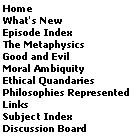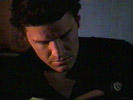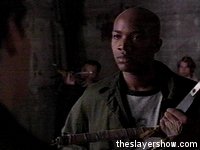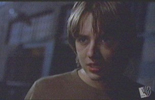
 |
|
|
|
 |
|
I think part of the lure of Angel is that he is neither evil nor pure, he has always been somewhere in between (except for the de-souled period). He has a conscience, and emotions, but he has a demon inside of him. That demon drives him, no matter how much he fights it (Closet Buffyholic, Jun 9 11:14 1998).
The morally ambiguous Angel
Nomenclature:
More detail on the relationship of Angel, Liam, and Angelus
"Everyone gets corrupted. But I find some forms of corruption are more pleasant...."
| Young Liam of Galway was the normal, mostly well-behaved son of a particularly puritanical father, who, no matter how Liam behaved, seemed to only find fault with him. In rebellion, Liam became what he thought his father wanted--"A drunken, whoring lay-about, and a terrible disappointment to your parents" (B1, Amends, The Prodigal). He spent a lot of time in pubs with the "dull, moronic" girls of his day, longing to meet someone "exciting and interesting". And that is the tantalizing lure Darla held out before him when he met her. Or perhaps Liam simply wanted to be something more than he was himself. But he never accomplished that in his mortal life. In Amends, Angel tells Buffy, "I'm weak. It's not the demon in me that needs killing... It's the man." |
|
Angelus, 1753-1898: Angelus is a particularly brutal vampire with a talent for sadism--until a gypsy curse restores the human soul to the vampire body.
"...Angel, you yourself wandered for a hundred years without ever seeking redemption." --Wesley
After regaining his soul, the pre-Whistler Angel could not define what he was and wandered in confusion for two years. When he tried to return to his vampire family, he was already feeling the pangs of conscience and was unable to feed on the innocent as his sire Darla wanted him to. He in fact tried to save a few of them. After his failure with Darla, Angel went to America in 1902. He spent the intervening years on the edge of human society, trying to avoid temptation. He rarely intervened in human lives, and rarely made a positive difference when he did.
When we see him in 1943, he is keeping himself apart from humanity. A hero lurks beneath the surface, but an unfortunate decision aboard a WWII submarine sends Angel back into his solitude.
"There is such a thing as forgiveness, right?" --Judy, AYNOHYEB
In 1952, he again reluctantly tries to help a group of people being terrorized by a demon. But when they turn their backs him, he turns his back on them.
He has another chance to help again in the 1970's when a donut shop clerk is shot in a robbery. Angel hesitates, and the man dies. Angel begins to leave the restaurant, then turns and goes back to the man and drinks from his neck. Did Angel hesitate because he wasn't sure how to help, or so that the man would die and he could feed without guilt? Either way, Angel has guilt, and he condemns himself to rat-infested alleyways and poverty.
Until a badly-dressed demon asks him to "become someone" by helping the Slayer.
The Angel we meet in Sunnydale in 1997 may not be all demon anymore, but his behavior is often a bit suspicious, as if the demon is lurking just below the surface. For example, in SAR, he frightens Cordelia in the parking lot by approaching her without telling her who he is. Then in a very human act, he lets her hang on him in the library to make Buffy jealous. Other examples of creepy Angel: School Hard, The Dark Age, and WML, Blood Money.
The love of a heroic young slayer transformed the souled ne'er-do-well vamp into a hero. Well, up until it made him go evil completely, anyway. Buffy finally dispatched him to hell, and when he was returned, Angel proved he was not afraid to use his demon side when he needed strength and aggression for fighting evil, as when he killed human monster Pete to save Buffy. Other examples of tough-guy Angel: Revelations, In the Dark, IFTP, Redefinition.
After being dogged by Wolfram and Hart for months in L.A., Angel gets tired of waiting for his destiny and decides to take the battle to the baddies. He feeds some lawyers to Darla and Drusilla, then tries to burn the vampires, and generally makes a nuisance of himself with Wolfram and Hart. But he finds himself lacking resources when he decides to fight the Senior Partners directly. Maybe that's because he fired his friends and has been nasty to his other sources.
Angel's epiphany about his purpose (or lack thereof) sends him back to Angel Investigations. Wesley is the boss now and Angel's just the muscle. But when Darla shows up mysteriously pregnant from her moment-of-true-despair romp with Angel, Angel has other things to worry about than his job. Now he's a nervous daddy to a helpless human infant.
When Wesley kidnaps Connor, the baby ends up in the clutches of Angel's mortal enemy, Holtz. Holtz takes Connor into the deadly Quortoth dimension, from which no one returns. In an act of out-of-control rage that is more human than demon, Angel screams at Wesley and tries to smother him to death.
Time heals many wounds, as does a mutual enemy. Wesley overcomes his subsequent bitterness enough to realize Angel's importance in the big picture. He saves Angel from the watery grave Connor condemned his father to. And just in time for the Beast of the apocalypse. But the Beast's Master doesn't want Angel interfering in her plans, and she arranges to have him turned into Angelus with the help of Angel's friends. And with the help of Angel's friends, Angel's soul is restored, and he makes a thwarted attempt to kill the Beast's Master.
Angel's quest to defeat the Beast's Master eventually makes him an adversary of Jasmine and of his own son. His defeat of Jasmine leaves Connor at a loss, and Angel choses to lose his own son in order to save him. That choice puts Angel in the arms of his worst enemy of all, Wolfram and Hart.
"Spike's a hero, and you're CEO of Hell, incorporated. What freakin' bizarro-world did I wake up in?"
Angel continues to try to do good as CEO of the Los Angeles office of Wolfram and Hart, but he is losing his own heart. He has lost faith in love, in his destiny and in himself. For years, Wolfram and Hart tried to find ways to distract Angel, so he would not interfere with their work supporting their evil clients. Their hope was to eventually corrupt Angel so that he would fight on their side. Have they finally succeeded? Not on the likely. Angel's stand against the Senior Partners and the Circle of the Black Thorn.
Well, of course, he's only human. Sort of. Examples of the very suave, very not-pathetic dark knight
My demon, myself: Joss gets a lot of moral ambiguity mileage out of blurring the lines between the human soul and the demon within. Angelus was consistently called "Angel" in the second season of BtVS (despite being referred to as "Angelus" in season one of BtVS). And when Angel recalls the deeds of Angelus from the un-souled period, he always says "I". Places where Angel and Angelus are treated as the same individual: "Angel", LTM, B&tB, Amends, Consequences, Somnambulist.
But Angel and Angelus and Liam are not three completely distinct individuals, either:
Angel's re-soulage good deeds
Alternative theory: There is no moral ambiguity in Angel. Kirbyclause's Angel=Evil
| Cordelia |  |
|
Because she chose to join the fight against evil while retaining the same prideful personality that made her the gang's adversary in the first season, Cordelia is one of the more morally ambiguous human characters in the Buffyverse.
The "hermetically insensitive" Cordelia
"I think it, I say it. That's my way"
Cordy: "...it's getting kind of late."
Wesley: "It's only seven thirty."
Cordy: "Really? Oh. In that case: get out!"
Cordelia's finest moments
"We've all got something to atone for." -- Doyle, City of...
 |
|
He could have deserted Angel, they really didn't know too much about each other at that point, and he charged back to help him.... He defended Cordelia's honor in Lonely Hearts(even though his motive might have been to win her attention) and In the Dark he ...tried to kill torture vamp, found the Gem of Amara, stood up to Spike, etc. The boy has cojones (Pirategrrl, 10/25/99 8:36).
| Doyle's defining moment: When it became clear that the only way to end the beacon's threat was to pull its power cables, Doyle realized this was his battle, not Angel's. Angel's job, as he explained to Doyle earlier, is to fight in the final battle between humanity and the netherworld; this was only the firing shot. Doyle felt the need to make up for not helping the Brachen demons all those years ago. Saving the Lister clan was one way to do it. |  |
Glenn
Quinn, 1970-2002
Other benevolent
demons
Wesley didn't make many friends in the gang when he first arrived in Sunnydale to take over Giles' watcher duties. Giles is their beloved friend, and Wesley was the naive and nervous interloper who compensated with bullying tactics.
Wesley's initial lack of emotional depth might be attributed to his nervousness about and tunnel-vision focus on his "position as Watcher to the Slayer." Perhaps he was trying so hard to adopt the appropriate persona that he became a card-board man. Often, when we hide our true selves and try to make ourselves conform to what we believe others expect of us, we become ridiculous. ...during the time he was on his own, after Graduation, he was able to mature. He very likely may have done some serious soul searching, examining his failure to bond with his Slayer(s) and his poor showing during the final battle against the Mayor. "The Rogue Demon Hunter" may have been his attempt to adopt those qualities he felt he lacked in his previous performance (Dizzy B, Jun 21 14:02 2000).
Bumbling Wesley moments:
 |
Wesley left gracefully after Buffy quit the Watcher's Council, only to get fired for his "failure" with the Slayers. Stranded in the U.S., he decides to fight demons on his own, a decision that leads him to Los Angeles and Angel.
|
Wesley and Fred:
Wesley's philosophies of fighting
Wesley's strategy in fighting has always relied on the utilitarian principle that the good of the many must outweigh the good of the few:
Wesley's ends are usually always noble. The means he uses to accomplish them, however, are steeped in moral ambiguity. How far is he willing to go in order to ensure the victory of Good?
The power and prestige of being the savior can be a tempting thing. ...Do the hard task. Save the day. Wes falls into this trap in Season 3 Angel, arrogantly believing he can save Angel and Angel's son by kidnapping the boy. Instead he just makes everything worse (shadowkat, 3/05/03 21:15)
[H]e gets involved with Lilah in an attempt to punish himself and possibly salvage what's left of her soul at the same time. He believes he has the power to do all this -- and forgets that he only has the power over himself (shadowkat, 3/05/03 21:15)
Wes' arrogance leads him to de-soul Angel and to bring Lilah into the hotel. Wes [will] not start doing the right thing until he begins to come face to face with the failures, begins to admit he's not the hero, he's not the savior, and he needs help. He needs to change his modus operandi. Stop making it about him. Because in a sense that's what it has become, all about him (shadowkat, 3/05/03 21:15).
| Charles Gunn |  |
Gunn is a bonafide hero, but he can be hot-headed and has a bit of an ego. As his sister Alonna said, he flirts with death, constantly testing his mettle against it.
"Hello! 'Gunn', 'stubborn', synonym?" --Cordy
"Gunn graduated with a major in dumb planning from Angel University. He sat at the feet of the master and learned well how to plan dumbly" --Cordelia, TTDL
I have always wondered why he initially abandoned his friends in the first place. He started out helping Angel Investigations occasionally and then all of a sudden he is working with them full-time. Sure, he gets paid there but he does not strike me as character who would be motivated by money .... So perhaps, Gunn feels as though he would be more useful working with a vampire with a soul and a girl who receives visions from TPTB. Maybe he feels like he is fighting the "war" on a larger scale with Angel and Co. rather than killing average street vamps day in and day out with his friends. However, I think the show never really addresses his motivations for switching groups (katy, 10:16 5/13/01).
Gunn's own insecurities contributed to his "one-dimensional" ["muscle"] role at A.I. as much as the rest of the gang did. He was feeling threatened by Wes' intellect and his attraction to Fred, and he started losing Faith in his own considerable talents (cjl, 3/27/03 8:02).
Fred
Winifred Burkle was a physics student working in a library when she read aloud from a book written in a mysterious foreign language and was pulled into the dimension of Pylea. There, she suffered five years as a slave and a fugitive before Angel and his friends brought her back to L.A. Since then, Fred has had some problems adjusting to a normal life. Well, as normal as it gets at Angel Investigations.
| Connor |  |
If Connor's issues could be boiled down to one word, that word would be "family". Connor's family--his parental figures in particular--have defined his life. And family is also the one that thing that seems to elude him.
By all rights, Connor shouldn't even exist. His biological parents are vampires. Nevertheless, by a miracle, this human boy was conceived and born, and though he is wanted and loved by both of his parents at the time of his birth, Connor spends only a few short months with Angel before he is taken from him. For most of his life, Connor's only family is Holtz, a surrogate father who abducts him into a hell dimension and never fails to remind him what his real parents were: His father, "Angelus", killed Holtz' only son. His mother, Darla, carried the infant Connor inside her while she fed on the blood of human victims. "Steven Holtz" is raised to hate his parents, and by extension, himself.
In Quortoth, Holtz taught five-year-old Connor to track by tying him to a tree and leaving him there. Connor's best time in getting loose and finding Holtz again? Five days.
[Holtz] did have affection for the boy. Question is, what is affection to Holtz? ...We know what Holtz was capable of....look at the icepick scene where he pinned Justine's hand to the table and left. Her test was to endure that pain and prove worthy of his attention. ...[The] loyalty [of abused kids] to the one who abused them [is] one of the hardest bonds to break. ...Holtz abused Connor physically, mentally, and though he may think he loved the boy, he used Connor to get even with Angel from the grave (Rufus 4/19/03 12:05).
When Steven is old enough, he returns to Earth to kill Angelus. And finds instead a being not so very different from himself--a preternaturally strong man who protects others from demonic evil. Holtz realizes that Steven has some kind of future with Angel. But he isn't going to let the souled vampire have his son so easily. He kills himself and lets Steven believe that Angel did it. A conflicted Steven/Connor banishes Angel to the bottom of the sea.
Over the summer, Connor finds a home at the Hyperion with Gunn and Fred. But his ability to bond with them is always hampered by his secret betrayal of their missing friend. When Angel returns, he tells Connor he loves him and kicks him out of the hotel. Connor becomes a satellite of the Angel Investigations family--always orbiting, but never quite one of them. And while he wants to pretend that that's perfectly O.K. with him, there are mysteries about his identity that only his father can help him solve.
He's a little wild, but so needy, so needing love, so wanting a family. [In Slouching, h]e spots a [family] in a car, and the first person he approaches is the teenager. He wants to check whether he's okay. He seems to both want to protect him, and be him. He's drawn toward families, and yet suspicious of AI (Rahael 2/14/03 15:44).
Next, Connor tries to make a home with Cordelia. His pursuit of her is about much more than teenaged lust. For him, it is proof that he is a worthy person. Demons his parents might be, but if Cordelia wants him, how can he truly be bad? Cordelia should have stepped carefully around his interest, but on the night the Beast emerges from the spot where Connor was born, she responds to his desires. And when she rejects him the next morning, it seems to be all about his "connection" to the Beast. Or perhaps it's all about Angel. Cordelia may live in Connor's apartment, but part of her is always back at the Hyperion with Dad.
It always comes back to Dad. And who is Connor's "dad"? When Angel becomes Angelus again, Connor informs the unsouled vampire that he is Connor's real father, not Angel. It's certainly what Connor was raised to believe. But does he actually believe this? Or is it really more of a fear? Regardless, this is the core of Connor's self-loathing--that he is the spawn of evil, as beneath contempt as the vampires he hunts. He tells Angelus that he will kill his father just like the others. "Promises, promises," the sadistic vampire replies. "Don't disappoint Daddy." Later, Connor, Wesley, and Cordelia find a house full of slaughtered victims of the Beast. Connor is shaken. He's seen dead humans before--in the offices of Wolfram and Hart. But this is very different. They weren't just human. They weren't just innocents. They were a mother, a son, a daughter, a father, a grandmother. He sees a calendar on the wall with the words "Daddy's birthday" encircled in a heart. He runs outside and vomits. Cordelia asks him what's wrong. "The family," he replies.
Connor longs for a human birthright, and that seems to be the one thing he'll never have. All he does have, he believes, is a personal duty to rid the world of his father. The vampire slayer Faith and the Angel Investigations team, on the other hand, want to get Angel back alive. Someone else who wants Angel alive--well, Angelus, anyway--is the Master of the now-dead Beast, a being Connor knows as Cordelia.
"Cordelia" reveals to Connor that she is pregnant, and tells him that the child is his. He now has a real family, she says--he has a child, and he has her, the mother of his child. She uses her condition to manipulate him--to allow her to carry out her plans without interference from Angel Investigations. And despite a few misgivings, Connor complies. Then comes the toughest test of all to his "family loyalty". "Cordelia" asks him to help her kill a girl whose blood is "necessary" for their baby's birth.
It's Connor's crisis moment. So the Powers that Be send the most compelling ammunition they can find to help him. They send family. But despite the fact that Darla speaks of her love for him, Connor chooses not to listen to her. She is the image of the mother he was raised to hate, no matter what she says. And he has a family in the here and now--finally. He must take their side.
Why did Connor choose to listen to Cordelia instead of Darla? Because he depended on Holtz's views of the world and his parents instead of his own. He blindly ignored the evidence before his eyes that Angel was trying to be a good man because then he'd have to rethink everything he'd ever learned from Holtz, and determine who/what was good and evil for himself (Arethusa, 4/07/03 10:09).
Connor has long feared that he had evil inside of him, just like his parents. And though this fear is unfounded, life has twisted him into a monster.
[Connor's] one of the bad guys. He's a bad guy because he's confused, lonely, immature, easily manipulated and very stubborn - not necessarily because he's evil (Josh Buckman, 4/24/2003).
After the birth of Jasmine, Connor is as much under her influence as everyone else. He bonds ever so briefly with a mojo'd Angel, then Angel and the others are freed from Jasmine's spell. They give Connor the cure as well. But Connor remains as loyal to Jasmine as he ever was. She is now his family. She has given him a purpose. He clings to this, even as his doubts and his anger creep back in. But finally his disillusionment is too much, even for him. When Angel ends Jasmine's reign, Connor kills her--the last hope for peace and family he feels he has.
Connor is ready to end his own existence as well, but Angel steps in and gives him a new one: a family, a home, a happy childhood. Connor now has no memory of the boy he was. But the happy childhood is fabricated, and although his new parents' love is as real as Joyce Summers' love for Dawn, Connor was no blank slate like Dawn was before she was given flesh. He had a past, and it's a past his father chose to take away from him.
Can Connor be saved by a lie? Perhaps, but not just the lie. When Connor and his new family unexpectedly show up and Wolfram and Hart asking for help with Connor's newly discovered powers, the demon who frabricated Connor's new memories returns they boy's grim past to him. And that is the key to real salvation: not to forget one's sins, or the torments of the past, but to acknowledge them and move on from them. When Angel seeks out his son before he takes on The Circle of the Black Thorn, he finds Connor preparing an application for an internship. But Connor realizes his life may never be completely normal. He still has the vampiric powers he was born with. And a desire to do good.
But with the help of his new family, and the final realization of his biological father's love, Connor is ready to face his future.
The impulsive but well-meaning Connor
Pictures are copyright ©
1997-2002 The WB Television Network
Screen shot credits
This page last modified 3/07/05